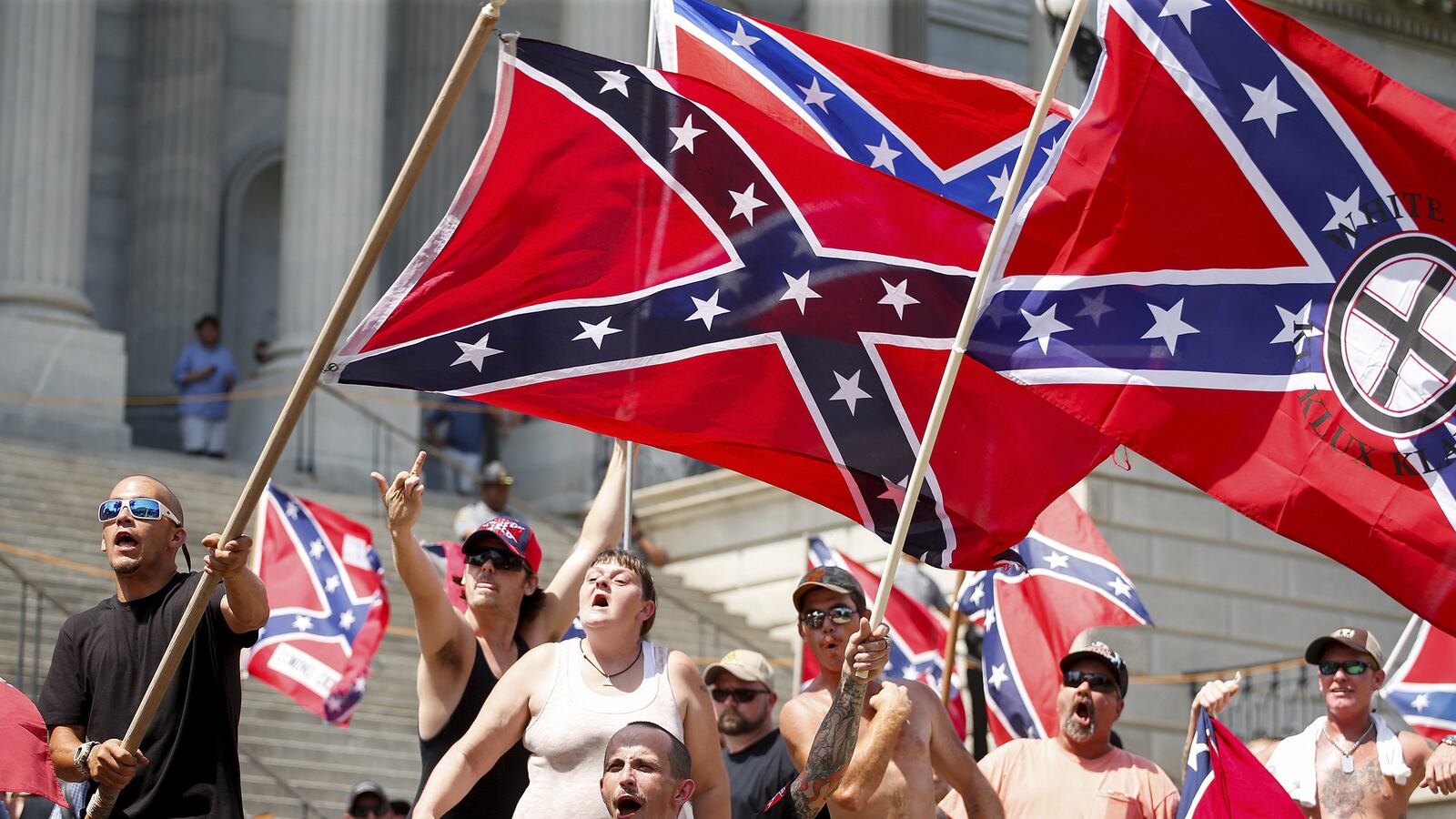On the grass where I sat and played with my friends and family in the Atlanta suburbs, the second Ku Klux Klan was founded in 1915. At the time I was none the wiser.
As a child, I would regularly retreat with my family and friends to the comfort of Stone Mountain Park to escape the city life. We’d climb the gigantic quartz rock mountain, and we’d lounge on the grass and gaze at the carvings of Stonewall Jackson, Robert E. Lee, and Jefferson Davis on the mountain’s face. I still have fond memories of watching the celebrated laser show held every Fourth of July at this Southern Mount Rushmore. It was an event that everyone wanted to attend: The fireworks are supposedly the best in the state!
Over the weekend, a pro-Confederate Flag rally was held at Stone Mountain Park and promoted the slogan “Heritage not Hate.” Yet despite the organizer’s best efforts, hatred showed up. A KKK member decided to attend and spew his racist bile, and the pro-Confederate Flag supporters promptly booed him and told him to leave. Likewise, anti-Confederate Flag supporters desecrated the flag, and the “Heritage not Hate” crowd asked them to leave or instructed other supporters to ignore them. Georgia Congressman Hank Johnson, an African American, even attended the event with the intent of learning more about the perspectives and values of some of his constituents.
“It challenges me to have a deeper appreciation for people who think differently than I,” said Johnson, as you hear someone yell “racist” in the background of the video. “We may think differently, but as long as we are not hating on each other I think we’re good.”
There were no arrests, and most in attendance said that the event was more peaceful than they anticipated. Yet the relative tranquility is nothing that merits excessive celebration. First of all, a quick browse through Facebook for Confederate Flag rallies will lead the visitor to a volume of hatred and bigotry that we would hope was confined to the past. But second, we’ve already condoned and accepted organized violence and hatred, as long as white Americans are the source, and this is a serious problem.
However, if progress is our aim, we should examine the inherently (yet possibly unintended) oppressive nature of the “Heritage not Hate” message.
The choice of Stone Mountain as the venue shows how celebrating “Heritage not Hate” is impossible. In 1915 the second Ku Klux Klan was founded at Stone Mountain. (The first Klan was founded in 1865 in Pulaski, Tennessee, by veterans of the Confederate Army and existed until 1870, when the federal government passed the Force Acts, which protected African-American liberties, and suppressed Klan activities.) A year later the United Daughters of the Confederacy (UDC) began carving Jackson, Lee, and Davis on the face of the mountain. The UDC’s primary objective may have been to celebrate their forefathers, but to believe now that these women did not hold bigoted beliefs that would be frowned upon today is delusional. Southern heritage and hatred are so interwoven that entertaining the idea that the two can be separated borders on lunacy.
This rally purported that within the Southern context, heritage and hate can be separated, and that collectively we can celebrate a history of white supremacy while ignoring that history’s hatred of non-whites. There is no evidence that this argument holds any water, and it only represents a sad attempt at saving face and perpetuating a false, idyllic narrative of constant white ascension in the United States.
Yet the most offensive aspect of the “Heritage not Hate” argument is how it continues the social standard of limiting Southern black voices with the attempt of reducing us to irrelevancy. Southern culture arose when black Americans were not considered people, and the social norm has always been one in which blacks have had limited agency over their lives. This argument sustains this structure because a Southern heritage must remain about white existence, and nothing else.
I’m not white, and I am as Southern as they come, and in no way does my heritage incorporate a support of white supremacy, racism, or the purity of white existence. My family’s presence in the South has been documented to the late 1700s. I’m from Georgia, my mother’s family is from Charleston, South Carolina—I’ve discussed this ancestry in a previous Daily Beast piece—and my father’s family is from Alabama, but we know his ancestors were bought in Savannah, Georgia.
My family’s Southern heritage more closely echoes the shooting at Emanuel AME Church and the recent vandalism at Ebenezer Baptist Church in Atlanta—where Martin Luther King Jr. was baptized and became co-pastor—where four Confederate battle flags were found on Thursday.
“This is the same as placing a swastika on the campus of a Jewish temple. Whatever the message was, clearly is not about heritage, but about hate,” said Raphael Warnock, senior pastor of Ebenezer Baptist Church. “It was disturbing and sickening, but unfortunately not terribly surprising. We’ve seen this kind of ugliness before.”
This is the Southern heritage that black Americans are acquainted with, but this perspective is missing in the “Heritage not Hate” argument. This absence perpetuates the continuation of a society and a narrative where black lives and black voices hold no agency and are pushed to the borders of irrelevancy. They encourage our expunging from the past and the present.
Southern black congressmen are welcomed to attend “Heritage not Hate” rallies at the location of the second founding of the KKK, but the idea is that they have an obligation to learn about the struggles and complexity of whiteness in the South. There is an assumption that no one in attendance wants to hear the narrative of a black Southerner because it is known that this story will contradict and erode the foundations of the rally and the entire movement.
I’m black and a Southerner and my heritage is one filled with hate—and not a hatred that emanates from my family. The hatred could have originated from the Confederacy, the KKK, and/or nondescript white Southerners who attacked and vandalized churches, spewed racial epithets, murdered black Americans or prevented us from finding housing and employment. All of these actions are spawned from the same notion of white supremacy, but with different names. They are constantly interwoven and inseparable from one another. This is not a discussion about semantics, but one about a society that has condoned hatred, terror, and black irrelevancy.
I’m not irrelevant. I do not terrorize those who are different than I am, and I do not hate the South, despite the horrors of Southern life inflicted upon black Americans. I’m as Southern as they come regardless of how comfortable that makes me feel.





